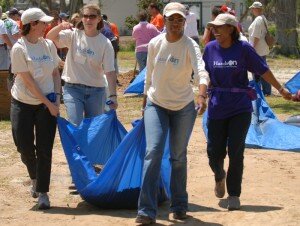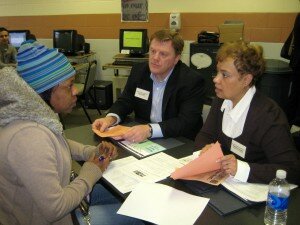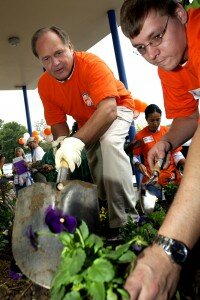 Today’s guest post comes from Michael LaRue, a Teen Volunteer Leader with HandsOn Suburban Chicago.
Today’s guest post comes from Michael LaRue, a Teen Volunteer Leader with HandsOn Suburban Chicago.
1) Let us know our boundaries: When you put teens in charge of something make sure you let them know their boundaries in the leadership. There have been many volunteer activities that I have participated in where I had no idea what I was suppose to do when it came to leadership. Whether it be overstepping my boundaries and giving instructions that the teen should not be giving. Or just standing there not knowing where to start because there have been people doing the jobs you thought were directed towards you.
2) Impact is most important to us! When thanking a Teen Volunteer know that most of us know we are doing a good job. If we weren’t happy with the progress or success of a program we wouldn’t be doing it. Therefore, if you’re going to thank us know that the only thanks we truly need is seeing the smile on the leader’s face or the smile of the people we’re serving (in my case the students I mentor).
3) Treat us with respect. Know that we are here to volunteer because we have passion for what we are volunteering for, As a teen leader I know that I don’t have full control and I would never expect that, what I do expect though is to be treated with respect for I am giving up time to help something that is important to me.
4) Don’t treat us like we are kids. We may not be adults, but we do have an idea of what is going on. Tell us what we need to do and allow us to ask for change in order to improve what needs to be done.
5) Don’t expect more out of teen volunteers than you expect out of yourself. We are a team; therefore we should be working together for a common goal, not separately.
Michael LaRue has been volunteering since he was a freshman in high school in his hometown of Arlington Heights, Illinois. In four short years, he’s worked with Riley Elementary School Homework Club tutoring students and helping them with homework. Through Buffalo Grove High School’s Interact Club, he’s helped to lead his peers in impacting their community in various ways. Most recently, he’s become a Teen Volunteer Leader with HandsOn Suburban Chicago, taking a key leadership role in the CHiL program, where he leads and supports 20 volunteers who work with middle school students to improve their grades through homework help as well by acting as role-models and mentors.
HandsOn Suburban Chicago is a partner and grantee of generationOn, Points of Light’s global youth service enterprise. Through a dynamic partnership called Ready-Set-Go!, generationOn and HandsOn Suburban Chicago have almost doubled the amount of direct service and leadership opportunities available to youth in northwest suburban Chicago. To learn more about Ready-Set-Go! and to access our free resources to train adults to be more effective managers of youth volunteers, click here.


 Heavy snow fall and ice storms can paralyze cities, making travel difficult and sometimes making even going outside dangerous.
Heavy snow fall and ice storms can paralyze cities, making travel difficult and sometimes making even going outside dangerous. Do you know what to do if your city essentially shuts down for three days (or more) because of winter weather? What if you lose power because of ice bringing down power lines?
Do you know what to do if your city essentially shuts down for three days (or more) because of winter weather? What if you lose power because of ice bringing down power lines? Make sure you have a disaster kit with at least a three day supply of food and water (one gallon per person per day), battery or hand-crank powered radio and flashlight, medicine, baby supplies (if needed), extra pieces of warm clothing and blankets, and extra supplies for your pets.
Make sure you have a disaster kit with at least a three day supply of food and water (one gallon per person per day), battery or hand-crank powered radio and flashlight, medicine, baby supplies (if needed), extra pieces of warm clothing and blankets, and extra supplies for your pets.
 Protect yourself from frostbite and hypothermia by dressing in multiple layers of loose fitting clothing (tight clothing can restrict blood flow)
Protect yourself from frostbite and hypothermia by dressing in multiple layers of loose fitting clothing (tight clothing can restrict blood flow)







